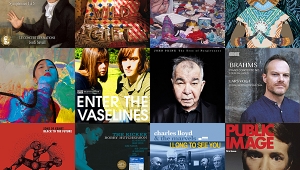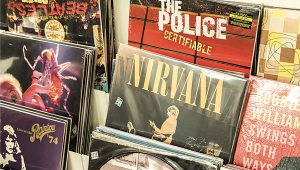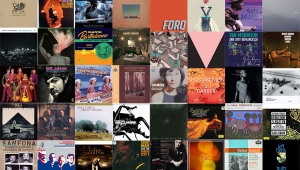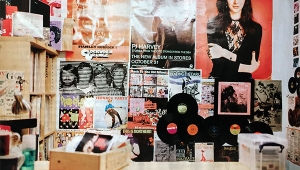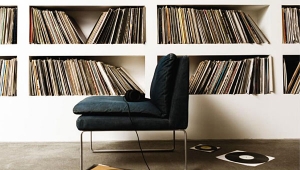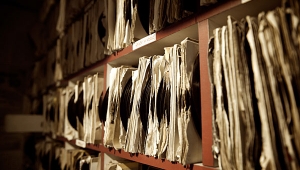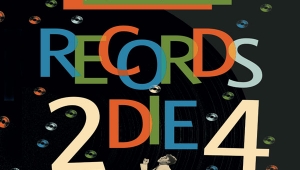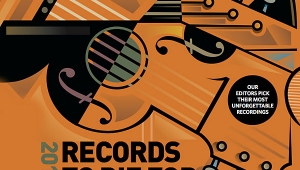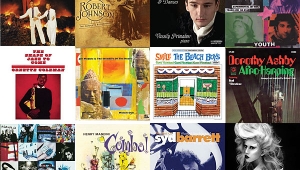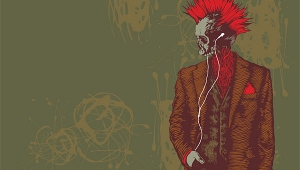| Columns Retired Columns & Blogs |
1992 Records To Die For Page 5
Thomas J. Norton
As I stated last time around, my selections follow a self-imposed criterion: they must be easily obtainable, which largely limits me to CDs. A rather looser requirement on performance might enable me to recommend a number of audiophile recordings; a looser one on sound might, more importantly, enable me to sneak in a recommendation of the 1962 von Karajan Tosca on London LP or CD, the original London cast recording of Miss Saigon, or the astonishing Kleiber Beethoven Fourth (with the Seventh) on, of all things, a Philips video laserdisc, any of which knock me out whenever I hear them. But that is not to be. Therefore, my nominations are:
KENNY RANKIN: Because of You
Kenny Rankin, vocals, guitar, piano; George Young, saxes, flute; Danilo Perez, piano; David Finck, bass; Dave Ratajczak, drums; Steve Kroon, percussion
Chesky Records JD63 (CD only). Kenny Rankin, David Chesky, prods; Bob Katz, eng. DDD. TT: 46:27
I have a slight problem in recommending a recording that I heard all the way through for the first time, as I write this, four short days ago. Will it wear well? No matter; the ground rules here are impeccable sound and performance, not timeless classics or definitive (which is not the same thing as impeccable) performances. Judging from the letters received after our similar feature last year, many readers seem to have misunderstood these points. Certainly, some listeners will express a preference for another artist's rendition of one or another of the old standards on this disc (the selections include several new songs as well). I find the versions here valid, moving, and superbly performed. The recording is first-rate, one of the best from Chesky---no faint praise. If this isn't purist miking, it is certainly minimalist, and very natural. Unhyped yet immediate sound is the result; Kenny Rankin's vocals, in particular, have an in-the-room feel. Highly recommended.
BALTIMORE CONSORT: On the Banks of Helicon Early Music of Scotland
The Baltimore Consort
Dorian DOR-90139 (CD only). David Brown, prod.; Craig D. Dory, Douglas Brown, Brian C. Peters, David H. Walters, engs. DDD. TT: 65:40
Many (but not all) of Dorian's recordings are made in the Troy (New York) Savings Bank Music Hall. Less well known than halls of similar quality in larger cities, this post-Civil War venue is nonetheless ranked by many as among the best (acoustically) in the world. Certainly this recording gives you some idea why; only a somewhat cold quality to the natural reverberation (from the empty hall?) detracts from a first-rate sound. Perspective is mid-hall; miking is said to be minimal, and I can believe it. The music is a delightful blend of (early instrument) instrumentals and vocals, the latter largely from soloist Custer LaRue's pure, silky soprano. Her style is decidedly non-operatic, and ideal for the music. There isn't a wrong step or a throwaway track throughout the 65+ minutes of music on this disc. Kudos is also due to those responsible for the genuinely informative and interesting program notes---all too rare today.(XV-1)
Bebo Moroni
LOU REED & JOHN CALE: Songs for Drella
Sire 26205-1 (LP), -2 (CD). Lou Reed, John Cale, prods.; Jeremy Darby, eng. AAA/ADD. TT: 54:55
My choice of this record might appear, in terms of sonic quality, somewhat strange. But I play guitar and some keyboards, and I know what the sound of guitar and keyboard is in a living room. I don't know any other recordings that reproduce the sound of voices, an electric guitar, and some keyboards in the home in such a perfect way. Is it "live sound"? Why not? What is our reference for live sound? A concert hall? Well, that's only one possibility among thousands. Or are we making a hierarchical division between the many faces of the truth?
ECCO LA PRIMAVERA: Florentine Music of the 14th Century
Music by: Francesco Landini, Magister Piero, Antonio Zacharia da Terano, Giovanni da Firenze, Lorenzo di Firenze, Jacopo da Bologna, Anonymous
The Early Music Consort, David Munrow, dir.
Argo ZRG 642 (LP). AAA.
The empty space left by David Munrow's tragic disappearance from ancient music studies and performances has never been filled. Listening to Ecco La Primavera, you can understand why. What the original Early Music Consort did is unrepeatable: their historic contributions to the excavation of medieval and renaissance music from the disastrous stereotypes of the recent past. Ecco La Primavera is probably David Munrow's masterwork, and one of the best-sounding records ever made. The rediscovery and performance of the Italian music of the trecento is one of the most important cultural events of the late 20th century, and Munrow's care in solving philological problems shows a magic touch in the ability to preserve both musicological needs and musical pleasure. Small but complex timbres accompanied by delicious dissonances, great dynamic contrast, and a splendid attention to the subtle nuances in one of the best Decca/Argo recordings ever.
ZOLTÁN KODÁLY: HÁry JÁnos Suite
BÉLA BARTÓK: Hungarian Sketches, Rumanian DancesAntal DorÁti, Philarmonia Hungarica Orchestra
INFO
Mercury 432 005-2 (CD), SR 90132 (LP). Wilma Cozart, recording dir.; Harold Lawrence, musical supervisor; C. Robert Fine, eng. ADD/AAA. TT: 67:53
There is something in Hungarian (as in Rumanian) music that is very difficult for Western people---and great Western conductors---to understand. It's something in the cutting of tempo: a slight and mathematical strascicato (drawling) in battere that contains a big part of the entire charm. I know only a few conductors able to let the orchestra understand and play with this feeling of tempo, and they are all Hungarian. I know only one conductor who could express the whole meaning of this music: the unforgettable Antal DorÁti. This is why no one ever reached the quality of his KodÁly, Bartók, and Ligeti. That's what everyone can hear in this outstanding performance, this intense and delicate Mercury recording. It's not a spectacular sound, but a very natural one, on the good old warm side. Maybe the most romantic recording ever. (XIV-3)
THE BEATLES: Sgt. Pepper's Lonely Hearts Club Band
Parlophone 3C 064-04005 (LP), CDP 7 46442 2 (CD). Geoff Emerick, eng.; George Martin, prod. AAA/AAD. TT: 39:52
This review could be condensed into just one phrase: this is the most beautiful record in history. Who can say the contrary? But I want to mention the great work of George Martin: first, when he directed the original recording session and found beautiful sounds that no digital workstation can approximate; then, when he remastered the recording in digital. The latter was a mere polishing of the original four tracks, an intelligent polishing that renewed the magnificence of an extraordinary sound. Listen to Paul McCartney's Rickenbacker bass, the woodwinds in "When I'm Sixty-Four," Ringo's drums in "Good Morning." Listen to the musical wonder of the 20th century...and you can even forget that on the same album is something called "Within You Without You." Nobody considers it part of this recording. (XI-2)
Peter W. Mitchell
J.S. BACH: Orchestral Suites 1-4, BWV 1066-1069
Max Pommer, Neues Bachisches Collegium Musicum Leipzig
Capriccio 10011 & 10012 (2 CDs only, available separately). Eberhard Richter, eng; Bernd Runge, prod. DDD. TTs: 49:45, 45:50
Among the many recorded performances of Bach's French-style "ouvertures," some emphasize the strongly accented dance rhythms in every movement while others stress propulsive energy and exhilarating forward momentum. Prof. Pommer's group, a chamber-orchestra subsidiary of the Leipzig Gewandhaus Orchestra, achieves both. The soloists, including the amazing Ludwig Güttler on trumpet, are uniformly excellent. Using mostly modern instruments, the small orchestra combines the required lightness and agility with satisfying tonal warmth, avoiding the astringency of many original-instrument recordings. And thanks either to sensitive accent miking or remarkably well-balanced playing, you can easily follow five or six contrapuntal lines at once.
VARIOUS: William Tell & Other Favorite Overtures
Auber: Fra Diavolo; Herold: Zampa; Offenbach: Orpheus in the Underworld; Reznicek: Donna Diana; Rossini: William Tell; Suppé: Light Cavalry, Poet & Peasant
Erich Kunzel, Cincinnati Pops Orchestra
Telarc CD-80116 (CD only). Jack Renner, eng; Robert Woods, prod. DDD. TT: 62:01
Kunzel's conducting of light classics sometimes lacks the sparkle that Arthur Fiedler and the Boston Pops brought to the same repertoire. No such reservation applies to this disc: each of its performances has a splendid balance of precision and gusto. In particular, Rossini's William Tell Overture grows more satisfying with each hearing---especially the various woodwind solos that precede the famous "Lone Ranger" theme. And while some Telarc discs have had balance problems (boomy bass, cloudy ambience), this disc is a great illustration of why Jack Renner loves to record in Cincinnati's Music Hall. Everything is clear and in perfect balance, demonstrating that spaced-omni miking need not produce vague imaging.
As I stated last time around, my selections follow a self-imposed criterion: they must be easily obtainable, which largely limits me to CDs. A rather looser requirement on performance might enable me to recommend a number of audiophile recordings; a looser one on sound might, more importantly, enable me to sneak in a recommendation of the 1962 von Karajan Tosca on London LP or CD, the original London cast recording of Miss Saigon, or the astonishing Kleiber Beethoven Fourth (with the Seventh) on, of all things, a Philips video laserdisc, any of which knock me out whenever I hear them. But that is not to be. Therefore, my nominations are:
KENNY RANKIN: Because of You
Kenny Rankin, vocals, guitar, piano; George Young, saxes, flute; Danilo Perez, piano; David Finck, bass; Dave Ratajczak, drums; Steve Kroon, percussion
Chesky Records JD63 (CD only). Kenny Rankin, David Chesky, prods; Bob Katz, eng. DDD. TT: 46:27
I have a slight problem in recommending a recording that I heard all the way through for the first time, as I write this, four short days ago. Will it wear well? No matter; the ground rules here are impeccable sound and performance, not timeless classics or definitive (which is not the same thing as impeccable) performances. Judging from the letters received after our similar feature last year, many readers seem to have misunderstood these points. Certainly, some listeners will express a preference for another artist's rendition of one or another of the old standards on this disc (the selections include several new songs as well). I find the versions here valid, moving, and superbly performed. The recording is first-rate, one of the best from Chesky---no faint praise. If this isn't purist miking, it is certainly minimalist, and very natural. Unhyped yet immediate sound is the result; Kenny Rankin's vocals, in particular, have an in-the-room feel. Highly recommended.
BALTIMORE CONSORT: On the Banks of Helicon Early Music of Scotland
The Baltimore Consort
Dorian DOR-90139 (CD only). David Brown, prod.; Craig D. Dory, Douglas Brown, Brian C. Peters, David H. Walters, engs. DDD. TT: 65:40
Many (but not all) of Dorian's recordings are made in the Troy (New York) Savings Bank Music Hall. Less well known than halls of similar quality in larger cities, this post-Civil War venue is nonetheless ranked by many as among the best (acoustically) in the world. Certainly this recording gives you some idea why; only a somewhat cold quality to the natural reverberation (from the empty hall?) detracts from a first-rate sound. Perspective is mid-hall; miking is said to be minimal, and I can believe it. The music is a delightful blend of (early instrument) instrumentals and vocals, the latter largely from soloist Custer LaRue's pure, silky soprano. Her style is decidedly non-operatic, and ideal for the music. There isn't a wrong step or a throwaway track throughout the 65+ minutes of music on this disc. Kudos is also due to those responsible for the genuinely informative and interesting program notes---all too rare today.(XV-1)
Bebo Moroni
LOU REED & JOHN CALE: Songs for Drella
Sire 26205-1 (LP), -2 (CD). Lou Reed, John Cale, prods.; Jeremy Darby, eng. AAA/ADD. TT: 54:55
My choice of this record might appear, in terms of sonic quality, somewhat strange. But I play guitar and some keyboards, and I know what the sound of guitar and keyboard is in a living room. I don't know any other recordings that reproduce the sound of voices, an electric guitar, and some keyboards in the home in such a perfect way. Is it "live sound"? Why not? What is our reference for live sound? A concert hall? Well, that's only one possibility among thousands. Or are we making a hierarchical division between the many faces of the truth?
The second reason (for sure, in non-hierarchical order) is the music. The Lou Reed/John Cale reunion is something historic for the perfect fusion of two different musical geniuses, and the result is somehow greater than the best of the Velvet Underground. Poetry, delicacy, strength: a masterpiece for gentle and tough people; for intelligent people. (XIV-2)
ECCO LA PRIMAVERA: Florentine Music of the 14th Century
Music by: Francesco Landini, Magister Piero, Antonio Zacharia da Terano, Giovanni da Firenze, Lorenzo di Firenze, Jacopo da Bologna, Anonymous
The Early Music Consort, David Munrow, dir.
Argo ZRG 642 (LP). AAA.
The empty space left by David Munrow's tragic disappearance from ancient music studies and performances has never been filled. Listening to Ecco La Primavera, you can understand why. What the original Early Music Consort did is unrepeatable: their historic contributions to the excavation of medieval and renaissance music from the disastrous stereotypes of the recent past. Ecco La Primavera is probably David Munrow's masterwork, and one of the best-sounding records ever made. The rediscovery and performance of the Italian music of the trecento is one of the most important cultural events of the late 20th century, and Munrow's care in solving philological problems shows a magic touch in the ability to preserve both musicological needs and musical pleasure. Small but complex timbres accompanied by delicious dissonances, great dynamic contrast, and a splendid attention to the subtle nuances in one of the best Decca/Argo recordings ever.
ZOLTÁN KODÁLY: HÁry JÁnos Suite
BÉLA BARTÓK: Hungarian Sketches, Rumanian DancesAntal DorÁti, Philarmonia Hungarica Orchestra
INFO
Mercury 432 005-2 (CD), SR 90132 (LP). Wilma Cozart, recording dir.; Harold Lawrence, musical supervisor; C. Robert Fine, eng. ADD/AAA. TT: 67:53
There is something in Hungarian (as in Rumanian) music that is very difficult for Western people---and great Western conductors---to understand. It's something in the cutting of tempo: a slight and mathematical strascicato (drawling) in battere that contains a big part of the entire charm. I know only a few conductors able to let the orchestra understand and play with this feeling of tempo, and they are all Hungarian. I know only one conductor who could express the whole meaning of this music: the unforgettable Antal DorÁti. This is why no one ever reached the quality of his KodÁly, Bartók, and Ligeti. That's what everyone can hear in this outstanding performance, this intense and delicate Mercury recording. It's not a spectacular sound, but a very natural one, on the good old warm side. Maybe the most romantic recording ever. (XIV-3)
THE BEATLES: Sgt. Pepper's Lonely Hearts Club Band
Parlophone 3C 064-04005 (LP), CDP 7 46442 2 (CD). Geoff Emerick, eng.; George Martin, prod. AAA/AAD. TT: 39:52
This review could be condensed into just one phrase: this is the most beautiful record in history. Who can say the contrary? But I want to mention the great work of George Martin: first, when he directed the original recording session and found beautiful sounds that no digital workstation can approximate; then, when he remastered the recording in digital. The latter was a mere polishing of the original four tracks, an intelligent polishing that renewed the magnificence of an extraordinary sound. Listen to Paul McCartney's Rickenbacker bass, the woodwinds in "When I'm Sixty-Four," Ringo's drums in "Good Morning." Listen to the musical wonder of the 20th century...and you can even forget that on the same album is something called "Within You Without You." Nobody considers it part of this recording. (XI-2)
Peter W. Mitchell
J.S. BACH: Orchestral Suites 1-4, BWV 1066-1069
Max Pommer, Neues Bachisches Collegium Musicum Leipzig
Capriccio 10011 & 10012 (2 CDs only, available separately). Eberhard Richter, eng; Bernd Runge, prod. DDD. TTs: 49:45, 45:50
Among the many recorded performances of Bach's French-style "ouvertures," some emphasize the strongly accented dance rhythms in every movement while others stress propulsive energy and exhilarating forward momentum. Prof. Pommer's group, a chamber-orchestra subsidiary of the Leipzig Gewandhaus Orchestra, achieves both. The soloists, including the amazing Ludwig Güttler on trumpet, are uniformly excellent. Using mostly modern instruments, the small orchestra combines the required lightness and agility with satisfying tonal warmth, avoiding the astringency of many original-instrument recordings. And thanks either to sensitive accent miking or remarkably well-balanced playing, you can easily follow five or six contrapuntal lines at once.
VARIOUS: William Tell & Other Favorite Overtures
Auber: Fra Diavolo; Herold: Zampa; Offenbach: Orpheus in the Underworld; Reznicek: Donna Diana; Rossini: William Tell; Suppé: Light Cavalry, Poet & Peasant
Erich Kunzel, Cincinnati Pops Orchestra
Telarc CD-80116 (CD only). Jack Renner, eng; Robert Woods, prod. DDD. TT: 62:01
Kunzel's conducting of light classics sometimes lacks the sparkle that Arthur Fiedler and the Boston Pops brought to the same repertoire. No such reservation applies to this disc: each of its performances has a splendid balance of precision and gusto. In particular, Rossini's William Tell Overture grows more satisfying with each hearing---especially the various woodwind solos that precede the famous "Lone Ranger" theme. And while some Telarc discs have had balance problems (boomy bass, cloudy ambience), this disc is a great illustration of why Jack Renner loves to record in Cincinnati's Music Hall. Everything is clear and in perfect balance, demonstrating that spaced-omni miking need not produce vague imaging.
- Log in or register to post comments

